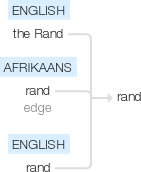Rand
sense 1 is from the Rand, the name of a goldfield district near Johannesburg; sense 2 is from Afrikaans, literally ‘edge’ (related to rand2).
wiktionary
From Middle English rand, from Old English rand(“edge, border, margin, rim, shore”), from Proto-Germanic *randaz, *randō(“edge, rim, crust”), from Proto-Indo-European *rem-(“to rest, prop or support oneself”). Cognate with Dutch rand(“edge, border, outskirts, rim”), German Rand(“edge, border, margin, rim, outskirts”), Swedish rand(“rand, stripe, edge, verge”). Related to rind.
Named after Witwatersrand; the last element is Afrikaans rand(“ridge”), from Dutch rand, from Old Saxonrand, from Germanic *randaz. Compare Etymology 1, and Rand.
See rant.
etymonline
rand (n.)
1839 in South African English, rant, "rocky ridge overlooking a river valley," from Afrikaans, from Dutch rand "edge, margin, rim," from Proto-Germanic *randaz "edge, rim, crust" (source also of Old English rand "brink, bank," Old High German rant "border or rim of a shield," German Rand "edge, border, margin," Old Norse rönd "shield-rim, shield," Swedish rand "stripe, edge, verge").
As a unit of currency, adopted by the Republic of South Africa in 1961 (see Krugerrand). Johnson's dictionary has rand "Border; seam: as the rand of a woman's shoe." The Old English cognate survived into Middle English as rand "strip or border of land."
